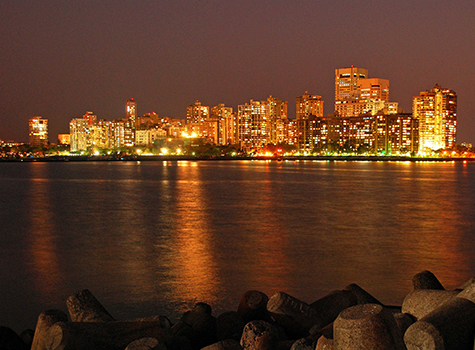
All my life I heard about my parents’ love story: an associate professor at Govt. College Lahore who was exploring socialism just a decade from partition, and a spoiled aristocratic woman who was one of the first women in college in Pakistan. By 1957, the newlyweds had landed in Chicago, where my dad had obtained a scholarship for his Ph.D. Famously, my mother was “slumming it” and could not even fry an egg. As the myth went, my grandfather did not allow children in the kitchen. That was a place for servants.
My grandfather was a district commissioner during the British Raj—or despite it. His was a world of finely bred horses, modest estates, but lots of prestige and servants. His lineage traced back to a family called the Hakimwalas, the healers assigned to the Moghul emperors. Given that history, a stiff set of traditions followed the family on their journey through the collapsing British Empire and ultimately to the partition of India.
These were a proud people who practiced a strict religion that was all their own. They didn’t pray much. They exercised a degree of aloofness that even today is a point of contention between the Sunni and Shia tribes. A strange mix of traditions and pride set them apart in their communities. They gave generously and took care of all who came for help. They were not corrupt and amassing wealth was shunned. The focus of the Hakimwalas was more on education and a disciplined life, rather than leaving legacies of villas and vast tracts of land.
Despite his commitment to community and tradition before riches, my grandfather was the recipient of many thousands of acres of fertile Punjabi land upon his arrival in Pakistan. He was not in the greatest health then, but the nine children had to live under his strict control. When I was born in 1960, he had been dead a few months. Nine siblings generate a lot of children, and as my generation expanded into a force living under a new Pakistan, we learned to keep ears peeled for discussions about the life of the legendary “Bawa.”
It seems Bawa was a system of government and a template of sober living for all of humanity. In the blistering summers of Montgomery (now Sahiwal), about 100 miles south of Lahore, the nine children of Bawa would get together with their young progeny and debates would ensue about Bawa’s abject superiority in all matters. Bawa was evidently a sort of reference manual for life. We learned quickly the rules of Bawa were going to continue into our generation. And there were many.
In Bawa-World, you showed anonymous generosity and projected modesty. My uncles rode bicycles and walked when they were some of the richest people in town. During religious events, they invited many in the community to share the food and festivities. Bawa shunned overeating, and you ate one roti only and one eye of the family was always pointing at you to make sure you did not take too much food. You wore clean and crisp clothes. You followed a cleaning ritual under the cool hand pump to stay sanitary. You discussed history. You studied Persian poetry and Western classics. You learned to ride the fine horses and you learned to play tennis. You did not communicate with the servants beyond official reasons.
You did not let servants encroach on your aristocratic privacy. In the sufi-istic world of Bawa, there were many weird contradictions. His world was not Islam—his religion was a world of tradition and culture. He did not allow ear or nose piercings for females. He insisted that the parting of your hair be changed every few days so the hair does not develop a memory of parting in one place. He shunned jewelry and fancy clothing. He hated displays of wealth and power. As my generation got older and cynical in an increasingly westernized world, we started making fun of the thousand sayings of Bawa, because the “What would Bawa do?” phenom was how our parents had lived their lives.
So, things like “Mysteries of the Toilet,” which Bawa would say if you blew your nose in public, and things like hygiene, and things like charity, and things like responsibility to family and community all haunted and hounded us as the adults grew old quoting Bawa and upholding the tyrannical principles that made up a world fighting for survival in a modernizing country. And indeed, his children were just human and there were scandals, women, alcohol, feuds, and the rest of what the world is about. In the end, however, they came together under the storm cloud that was Bawa. Many are dead now, including my mother.
My mother stayed up nights for most of her life and nobody knew what she was thinking. She would cut supari, read, or watch TV but would go to bed around sunrise and wake up at 10 or 11 and have the cook fix her breakfast when he was scrambling to get lunch set up for many daily visitors. She maintained a stiff upper lip practically until death, but something interfered—her husband.
My dad beat her to heaven or wherever by four years. He was an odd man, a combination of a monk and a guru. He loved everyone. He was generous to all to the extent that it would spin the heads of the Hakimwalas and their progeny. His last stand was to put the kids of the cook in a very expensive private school. The driver would take them daily dressed in the nicest clothes and my dad spared no expense to make sure they stayed well supplied in books and comforts. Then the 2005 earthquake happened and a virulent flu spread and the relatives of the cook brought it to the servant’s quarters and my dad stayed up days watching after the kids and got the flu—and died.
“He was a weak man,” my mother said, tears running down her face in early 2007. She never showed emotion but folding your dead husband’s clothes for charity donation is not easy. “But he was a good man.”
The day before I left for America, the cook’s son was sitting on a chair next to my mom, reading aloud a children’s book in English. A compromise had happened. A few years earlier, my parents had helped a butler/houseboy through college and he was now an accountant. What would Bawa say, I wondered.
———-
Ahsen Jillani a former editor and publisher, is originally from Islamabad , Pakistan , and now lives in Mint Hill. He owns Must Media, a PR company focusing on both political and corporate clients.
Posted: Tuesday, May 29, 2018



